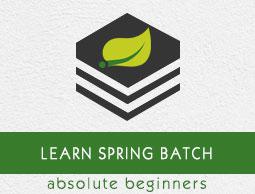Spring Batch - Basic Application
This chapter shows you the basic Spring Batch application. It will simply execute a tasklet to displays a message.
Our Spring Batch application contains the following files −
Configuration file − This is an XML file where we define the Job and the steps of the job. (If the application involves readers and writers too, then the configuration of readers and writers is also included in this file.)
Context.xml − In this file, we will define the beans like job repository, job launcher and transaction manager.
Tasklet class − In this class, we will write the processing code job (In this case, it displays a simple message)
Launcher class − in this class, we will launch the Batch Application by running the Job launcher.
jobConfig.xml
Following is the configuration file of our sample Spring Batch application.
<beans xmlns = "http://www.springframework.org/schema/beans"
xmlns:batch = "http://www.springframework.org/schema/batch"
xmlns:xsi = "http://www.w3.org/2001/XMLSchema-instance"
xsi:schemaLocation = "http://www.springframework.org/schema/batch
http://www.springframework.org/schema/batch/spring-batch-2.2.xsd
http://www.springframework.org/schema/beans
http://www.springframework.org/schema/beans/spring-beans-3.2.xsd ">
<import resource="context.xml" />
<!-- Defining a bean -->
<bean id = "tasklet" class = "a_sample.MyTasklet" />
<!-- Defining a job-->
<batch:job id = "helloWorldJob">
<!-- Defining a Step -->
<batch:step id = "step1">
<tasklet ref = "tasklet"/>
</batch:step>
</batch:job>
</beans>
Context.xml
Following is the context.xml of our Spring Batch application.
<beans xmlns = "http://www.springframework.org/schema/beans"
xmlns:xsi = http://www.w3.org/2001/XMLSchema-instance"
xsi:schemaLocation = "http://www.springframework.org/schema/beans
http://www.springframework.org/schema/beans/spring-beans-3.2.xsd">
<bean id = "jobRepository"
class="org.springframework.batch.core.repository.support.MapJobRepositoryFactoryBean">
<property name = "transactionManager" ref = "transactionManager" />
</bean>
<bean id = "transactionManager"
class = "org.springframework.batch.support.transaction.ResourcelessTransactionManager" />
<bean id = "jobLauncher"
class = "org.springframework.batch.core.launch.support.SimpleJobLauncher">
<property name = "jobRepository" ref = "jobRepository" />
</bean>
</beans>
Tasklet.java
Following is the Tasklet class which displays a simple message.
import org.springframework.batch.core.StepContribution;
import org.springframework.batch.core.scope.context.ChunkContext;
import org.springframework.batch.core.step.tasklet.Tasklet;
import org.springframework.batch.repeat.RepeatStatus;
public class MyTasklet implements Tasklet {
@Override
public RepeatStatus execute(StepContribution arg0, ChunkContext arg1) throws Exception {
System.out.println("Hello This is a sample example of spring batch");
return RepeatStatus.FINISHED;
}
}
App.java
Following is the code which launces the batch process.
import org.springframework.batch.core.Job;
import org.springframework.batch.core.JobExecution;
import org.springframework.batch.core.JobParameters;
import org.springframework.batch.core.launch.JobLauncher;
import org.springframework.context.ApplicationContext;
import org.springframework.context.support.ClassPathXmlApplicationContext;
public class App {
public static void main(String[] args)throws Exception {
// System.out.println("hello");
String[] springConfig = {"a_sample/job_hello_world.xml"};
// Creating the application context object
ApplicationContext context = new ClassPathXmlApplicationContext(springConfig);
// Creating the job launcher
JobLauncher jobLauncher = (JobLauncher) context.getBean("jobLauncher");
// Creating the job
Job job = (Job) context.getBean("helloWorldJob");
// Executing the JOB
JobExecution execution = jobLauncher.run(job, new JobParameters());
System.out.println("Exit Status : " + execution.getStatus());
}
}
On executing, the above SpringBatch program will produce the following output −
Apr 24, 2017 4:40:54 PM org.springframework.context.support.AbstractApplicationContext prepareRefresh
INFO:Refreshing org.springframework.context.support.ClassPathXmlApplicationContext@2ef1e4fa: startup date [Mon Apr 24 16:40:54 IST 2017]; root of context hierarchy
Apr 24, 2017 4:40:54 PM org.springframework.beans.factory.xml.XmlBeanDefinitionReader loadBeanDefinitions INFO: Loading XML bean definitions
Apr 24, 2017 4:40:54 PM org.springframework.beans.factory.xml.XmlBeanDefinitionReader loadBeanDefinitions
INFO: Loading XML bean definitions
Apr 24, 2017 4:40:54 PM org.springframework.beans.factory.support.DefaultListableBeanFactory preInstantiateSingletons
Apr 24, 2017 4:40:55 PM org.springframework.batch.core.launch.support.SimpleJobLauncher afterPropertiesSet
INFO: No TaskExecutor has been set, defaulting to synchronous executor.
Apr 24, 2017 4:40:55 PM org.springframework.batch.core.launch.support.SimpleJobLauncher$1 run
INFO: Job: [FlowJob: [name=helloWorldJob]] launched with the following parameters: [{}]
Apr 24, 2017 4:40:55 PM org.springframework.batch.core.job.SimpleStepHandler handleStep INFO: Executing step: [step1]
Hello This is a sample example of spring batch
Apr 24, 2017 4:40:55 PM org.springframework.batch.core.launch.support.SimpleJobLauncher$1 run
INFO: Job: [FlowJob: [name=helloWorldJob]] completed with the following parameters: [{}] and the following status: [COMPLETED]
Exit Status : COMPLETED


